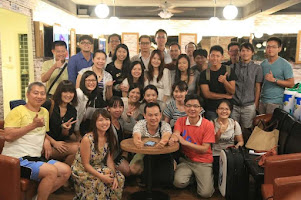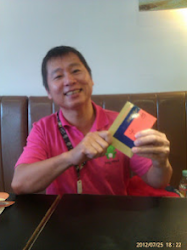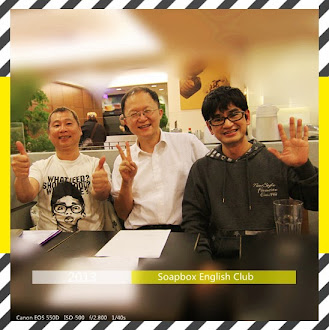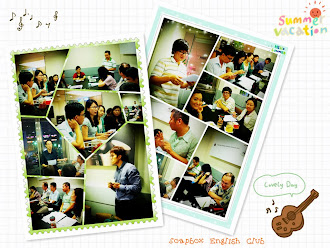陽光甜味咖啡館 Sun Sweet Cafe
We meet right here every Tuesday, Friday and Saturday evening.
Dare to dream!
勇敢夢!
LOVE YOURSELF!
愛自己!
歡迎您加入 英文/知識/交友 文章請點選欄位
周三(11/30)1.團體盲思 /同志權2.英文新聞讀報討論
清晨6:43
No comments
板橋區文化路段421巷11弄1號 (陽光甜味咖啡館)
新埔捷運站1號出口 旁邊7-11巷子進入20公尺 看到夏朵美髮院 左轉 PM7:00--9:30
(新聞讀報討論-- 討論的第二階段
以當日China Post 報紙新聞 做英文練習 來擴展學習方向)
任選其一主題 新朋友們 不會太難 不用緊張 讓我們互相學習
What is Groupthink? By Kendra Cherry
Groupthink is a term first used in 1972 by social psychologist Irving L. Janis that refers to a psychological phenomenon in which people strive for consensus within a group. In many cases, people will set aside their own personal beliefs or adopt the opinion of the rest of the group.
People who are opposed to the decisions or overriding opinion of the group as a whole frequently remain quiet, preferring to keep the peace rather than disrupt the uniformity of the crowd.
Understanding Groupthink
Why does groupthink occur? Think about the last time you were part of a group, perhaps during a school project. Imagine that someone proposes an idea that you think is quite poor. However, everyone else in the group agrees with the person who suggested the idea and the group seem set on pursuing that course of action. Do you voice your dissent or do you just go along with the majority opinion?
In many cases, people end up engaging in groupthink when they fear that their objections might disrupt the harmony of the group or suspect that their ideas might cause other members to reject them.
Janis suggested that groupthink tends to be the most prevalent in conditions where there is a high degree of cohesiveness, situational factors that contribute to deferring to the group (such as external threats, moral problems, difficult decisions), and structural issues (such as impartial leadership and group isolation).
The Symptoms of Groupthink
The Benefits and Dangers of Groupthink
Groupthink can have some benefits. When working with a large number of people, it often allows the group to make decisions, complete tasks, and finish projects quickly and efficiently.
However, this phenomenon also has costs as well. The suppression of individual opinions and creative thought can lead to poor decision-making and inefficient problem-solving.
What Causes Groupthink?
A number of factors can influence this psychological phenomenon. It tends to occur more in situations where group members are very similar to one another and is more likely to take place when a powerful and charismatic leader commands the group. Situations where the group is placed under extreme stress or where moral dilemmas exist also increase the occurrence of groupthink.
Q:
What is groupthink?
Do you adopt the opinion of the majority group or dare to express your own opinions?
Why most people preferring to keep the peace rather than disrupt the uniformity of the crowd?
Pros and cons of groupthink?
Do you voice your true feelings? How to express your feelings?
What causes groupthink?
Why is cooperation important in teamwork?
團體迷思(英文:Groupthink,亦作團體盲思、集體錯覺)是一個心理學現象,指的是團體在決策過程中,由於成員傾向讓自己的觀點與團體一致,因而令整個團體缺乏不同的思考角度,不能進行客觀分析。一些值得爭議的觀點、有創意的想法或客觀的意見不會有人提出,或是在提出之後,遭到其他團體成員的忽視及隔離。團體迷思可能導致團體作出不合理、甚至是很壞的決定。部份成員即使並不贊同團體的最終決定,但在團體迷思的影響下,也會順從團體。
一般認為團體迷思這個概念是由美國心理學家艾爾芬·詹尼斯(Irving Janis)首先提出。但William Safire於2004年8月8日《紐約時報雜誌》(New York Times Magazine)撰文指出,團體迷思一詞實為William H. Whyte於1952年在《財富雜誌》中首先提出。
1972年,詹尼斯利用「團體迷思」一詞形容團體作出不合理決定的決策過程。詹氏對「團體迷思」的原定義為「一種思考模式,團體成員為維護內團體的凝聚力、追求團體和諧共識,而不能現實地評估其他可行辦法」。

同志權
Civil groups supporting same-sex marriage rally around Taiwan
Taipei, Nov. 27 (CNA) Several civil groups that support same-sex marriage staged rallies in eastern, central and southern Taiwan on Sunday.
In Tainan, scores of supporters braved the cold rain to hold placards reading "Safeguard equal marriage rights for all," and representatives of several groups took turns to speak.
One representative said this was the first time that the LGBT community is most likely to successfully obtain rights for same-sex marriage, and he expressed the hope of making more efforts.
He noted that there will be a large rainbow parade on Dec. 31 in Tainan, and he hoped more will people will participate in the parade.
週二(11/29)1.你有錢了 就變混蛋了2.復興航空解散/空服員
中午12:18
No comments
板橋區文化路段421巷11弄1號 (陽光甜味咖啡館)
新埔捷運站1號出口 旁邊7-11巷子進入20公尺 看到夏朵美髮院 左轉 PM7:00--9:30
(***本周 中場時間 Peter 將為好友們 做個"陶藝品創新"
小講演 請大家多支持) 學習就是擴展眼界 謝謝您


新埔捷運站1號出口 旁邊7-11巷子進入20公尺 看到夏朵美髮院 左轉 PM7:00--9:30
(***本周 中場時間 Peter 將為好友們 做個"陶藝品創新"
小講演 請大家多支持) 學習就是擴展眼界 謝謝您
你有錢了 就變混蛋了
If You Were Rich, You’d Be a Jerk Too Angelina Chapin Contributors Editor, Huffington Post
There is no doubt that being rich changes how someone acts. For example, psychologists have found the class of people who travel on private jets have less empathy than those who take the bus. Multiple studies show the wealthy are more oblivious to people’s emotions, likely because money makes them self-sufficient. But having goals and ambitions can make anyone less tolerant of other humans.
In their daily lives, most people who earn a steady paycheque and have busy schedules think mostly of themselves. They avoid eye contact with homeless people, curse the barista in long coffee lines and get annoyed by how much space baby carriages take up on public transit. And although they may not live in gated mansions, most middle-class people live lives segregated from their neighbours, divorced from the idea of “community.”
Rather than acknowledge the reality of privilege, most people create narratives to justify their accomplishments. This phenomenon is particularly acute in rich people, who studies show are most likely to believe the idea that hard work begets success. They tend to blame individuals for economic failure (whereas lower classes blame unfair circumstances) and as a result, often vote for policies that exacerbate inequality.
But it’s not just the wealthy who chalk up their good fortune to long hours and good genes instead of lucky circumstances. Anyone born into a life of advantages creates stories to avoid uncomfortable truths. Gentrifiers tell themselves they are making a neighbourhood “more diverse,” instead of displacing low-income residents. White employers tell themselves applicants who don’t look like them are less “qualified” and men’s rights groups tell themselves feminists are trying to oppress dudes.
Belief in the idea that individuals earn their success leads the ultra-wealthy to be less generous. A study by social psychologist Paul Piff found that those who make $25,000 and under are 44 per cent more likely to give some of the money to a stranger than those making between $150,000 to $200,000.
A recent Chronicle of Philanthropy study found that those who earn between $50,000 and $75,000 give twice as much to charity than those who make more than $200,000 per year. In addition to feeling entitled to their money, rich people often prefer to spend hard-earned cash on their lavish lifestyles.
Anyone who has gone from being a student to an intern to a full-time employee knows on a smaller level what it’s like for luxuries to quickly become necessities. Once you can afford to buy lunch every day you no longer want to bring tupperwares full of leftovers to the office. Once you can afford to renovate one room, suddenly you notice a need for accent walls and heated floors all over your house. The truth is the more money someone makes, the more they want to spend it on bigger TVs rather than on other people.
There’s no doubt that rich people tend to act more selfishly, which can lead to corruption. But you do not have to be a billionaire to exhibit Gordon Gekko-like behaviour. When we criticize the wealthy we should also recognize that the same potential for extreme selfishness exists in all of us.
Q:
Do you believe the idea that being rich changes how someone acts?
Do you think that rich people have less empathy and less generous?
Do you blame for unfair circumstances?
Do you admire the lifestyles of rich people?
How to Make Money Fast?
Do more selfish people tend to be more successful in life?
Is giving money the only way to help poor people?
復興航空解散/空服員
Taiwan’s ailing TransAsia Airways shuts down due to financial woes
Carrier, which abruptly suspended flights on Tuesday, losing US$90,000 a day after being hit by fall in mainland Chinese visitors to Taiwan
Taiwan’s troubled airliner TransAsia Airway on Tuesday announced that it is dissolving itself due to mounting financial difficulties.
Speaking at a hastily called press conference, the company’s chairman Vincent Lin said the regional carrier was losing NT$10 million (about US$90,000) daily, or NT$200 million to NT$300 million monthly.
“Why dissolve now? The company is not yet bankrupt, it still has more assets than debts. So the company does not want to wait until it’s bankrupt,” Lin said.
Doing so now was in the best interests of its employees, customers and creditors, he said, adding that shareholders would meet in mid-January to approve the decision of the board of directors.
Flight Attendant
A flight attendant is someone who staffs a plane to ensure that passengers are safe and comfortable. The vast majority of flight attendants work for commercial airlines, although private air transport companies also keep small staffs of flight attendants available. You may also hear a flight attendant referred to as a member of the cabin crew, reflecting the idea that he or she is part of the crew which ensures that the plane reaches its destination safely and with a minimum of disruption.
In the early days of flying, flight attendants were known as stewards or stewardesses, in a holdover from the days of traveling by ship. Flight attendants performed many of the same tasks as the ship's steward, such as attending to passenger needs and keeping an eye out for safety. Over time, however, people began to express a desire for a gender-neutral term, and “flight attendant” began to be used instead. In early 21st century, “cabin crew” became more popular, emphasizing the flight attendant's role as a member of the airline team, rather than someone who only takes care of passengers.
Q:
What are your opinion about the news reported that TransAsia Airways shuts down?
What do you think of TransAsia Airways?
How to handle being laid off?
What do you think of the air planes’ safety?
What do you think of flight attendant? Is being a flight attendant a good job?
Is being an airline pilot a good job?
周六(12/3) 1.假新聞衝擊2.時尚陷阱 下午4:00pm--6:00pm
凌晨4:49
No comments
板橋區文化路一段421巷11弄1號 (陽光甜味咖啡館)
新埔捷運站1號出口 旁邊7-11巷子進入20公尺 看到夏朵美髮
左轉 聚會時間下午4:00pm--6:00pm
 假新聞衝擊
假新聞衝擊
China is calling for stricter restrictions
on the internet in the wake of terrorism and the increasing circulation of fake
news stories on social media sites, which allegedly played a role in helping
Republican Donald Trump win the presidential election in the U.S.
China’s vision of a more secure cyberspace
with rigid censorship comes at a time when the West is debating on the fake
news surge and if smartphone companies should cooperate with federal agents to
help them gain access to private information in phones belonging to suspected
criminals.
At the third World Internet Conference held
in Wuzhen last week, Chinese officials and business heads called for more
regulations on China’s already highly censored internet. They also urged the
formation and implementation of international internet rules.
“The booming scale of the internet means
harmful information such as online pornography, intimidation and fraud are more
common than ever,” Cyberspace Administration of China Deputy Minister Ren
Xianliang said at the conference which ended Friday.
President Xi Jinping said via a video
speech that China will “work with the international community to ensure the
common well-being of humanity, uphold cyber sovereignty, promote more fair and
equitable global Internet governance and bring about an open, inclusive and
secure cyberspace that features equality, mutual respect, innovation and
orderly development.”
China has nearly 710 million internet users
of which 75 percent are 10 to 39 years old. Ma Huateng, chairman and chief
executive of Tencent Holdings, which owns China’s popular instant messaging app
WeChat, spoke of the need to curb fake news stories on the internet.
WeChat, which has nearly 700 million active
users as of last year, handled 17 million complaints so far in 2016 with people
reporting the spread of “illicit information," Ma said.
“In the past two or three years, many
children and seniors have become our users. Sometimes they lack the acumen to
discern true or false. Hence, we’ll do more to ensure security and social
stability,” he added. “Tencent has always been strict in cracking down on fake
news and we see it as very necessary.”
China, earlier in November, passed a new
cybersecurity law tightening its control over the internet, which experts said
may technologically isolate the country from the rest of the world. The law,
which will come into force during summer next year, seeks to ensure a balance
between privacy and security.
“The already heavily censored internet in
China needs more freedom, not less,” Human Rights Watch’s China Director Sophie
Richardson said in a statement. “Despite widespread international concern from
corporations and rights advocates for more than a year, Chinese authorities
pressed ahead with this restrictive law without making meaningful changes.”
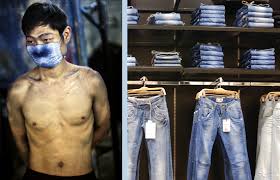
時尚陷阱
By Rebecca Ley for the Daily Mail
As she opened the packet of new T-shirts she had bought from a well-known High Street chain, Merlene Paul hoped that, just for once, she would be able to indulge her former love of clothes.
But within seconds she was overwhelmed by familiar sensations. ‘My throat closed up, my eyes started to sting and a sharp, acrid smell made my nose prickle,’ says the retired 63-year-old. ‘I knew I had to get away from the T-shirts quickly, or I’d have a full-blown reaction.’
The culprit? Formaldehyde. It is most commonly associated with preserving corpses, but, alarmingly, many big clothing chains also use it to give their wares a fresh, unwrinkled appearance and prevent mildew during shipping.
Forced to quit two jobs: Samantha Devlin suffers from 'POTS' (Postural Orthostatic Tachycardia Syndrome) which makes her allergic to toxic chemicals
Not that you’d necessarily know. The manufacturers of clothes sold in the UK are not required to disclose the use of the chemical on labels. And despite tests in New Zealand that discovered formaldehyde levels in some Chinese clothes exports up to 900 times higher than the prescribed safety limit, no testing has been done on similar clothes sold in Britain.
Yet formaldehyde, a highly toxic, colourless gas, has been linked to skin irritation and allergic reactions. Even more worryingly, the chemical is classified as a human carcinogen by the International Agency for Research on Cancer.
And according to Merlene, from Hungerford, Berkshire, it’s ubiquitous: ‘It’s in mattresses, bedding, carpeting, furniture and in most of the clothes that we buy. Department stores smell pungently of it. And washing clothes before you wear them isn’t always enough to get rid of it.’
She first experienced a problem 20 years ago when she was working in the interior design industry, spending hours each day in a workshop where rolls of fabric were being stored.
時裝是生活中絢爛的一部分,消費者在選購時首重樣式和質料,但是衣服和鞋子製作過程中使用許多有毒物質,讓我們在不知不覺中被有毒物質環繞。
迫於全球化競爭、價格壓力和時裝業僥倖心態,大型服裝連鎖在中國印度和孟加拉都有設廠,低廉的人工和鬆散的環保規範成為這些地區吸引廠商的特點,但是受影響的不只是當地的工人,接觸到的消費者也受到毒物汙染。
服裝中的毒物是一般消費者尚未意識到的一環,【時尚陷阱】將深入追蹤這些有毒物質,防腐防霉劑、鉻、偶氮染料和氯氣都是美國及歐盟明文禁止的使用,但在這些地區卻是隨處可見,即使是有機材質也難免於有毒染劑,也常常是基因改造的棉花製成。
左轉 聚會時間下午4:00pm--6:00pm
假新聞衝擊
Facebook Fake News Stories: China Calls For
More Censorship On Internet Following Social Media's Alleged Role In US
Election
By Mary Pascaline @PadawanRadjou
China is calling for stricter restrictions
on the internet in the wake of terrorism and the increasing circulation of fake
news stories on social media sites, which allegedly played a role in helping
Republican Donald Trump win the presidential election in the U.S.
China’s vision of a more secure cyberspace
with rigid censorship comes at a time when the West is debating on the fake
news surge and if smartphone companies should cooperate with federal agents to
help them gain access to private information in phones belonging to suspected
criminals.
At the third World Internet Conference held
in Wuzhen last week, Chinese officials and business heads called for more
regulations on China’s already highly censored internet. They also urged the
formation and implementation of international internet rules.
“The booming scale of the internet means
harmful information such as online pornography, intimidation and fraud are more
common than ever,” Cyberspace Administration of China Deputy Minister Ren
Xianliang said at the conference which ended Friday.
President Xi Jinping said via a video
speech that China will “work with the international community to ensure the
common well-being of humanity, uphold cyber sovereignty, promote more fair and
equitable global Internet governance and bring about an open, inclusive and
secure cyberspace that features equality, mutual respect, innovation and
orderly development.”
China has nearly 710 million internet users
of which 75 percent are 10 to 39 years old. Ma Huateng, chairman and chief
executive of Tencent Holdings, which owns China’s popular instant messaging app
WeChat, spoke of the need to curb fake news stories on the internet.
WeChat, which has nearly 700 million active
users as of last year, handled 17 million complaints so far in 2016 with people
reporting the spread of “illicit information," Ma said.
“In the past two or three years, many
children and seniors have become our users. Sometimes they lack the acumen to
discern true or false. Hence, we’ll do more to ensure security and social
stability,” he added. “Tencent has always been strict in cracking down on fake
news and we see it as very necessary.”
China, earlier in November, passed a new
cybersecurity law tightening its control over the internet, which experts said
may technologically isolate the country from the rest of the world. The law,
which will come into force during summer next year, seeks to ensure a balance
between privacy and security.
“The already heavily censored internet in
China needs more freedom, not less,” Human Rights Watch’s China Director Sophie
Richardson said in a statement. “Despite widespread international concern from
corporations and rights advocates for more than a year, Chinese authorities
pressed ahead with this restrictive law without making meaningful changes.”

時尚陷阱
時尚陷阱
Toxic dyes, lethal logos, cotton drenched in formaldehyde... How your clothes could poison you
By Rebecca Ley for the Daily Mail
As she opened the packet of new T-shirts she had bought from a well-known High Street chain, Merlene Paul hoped that, just for once, she would be able to indulge her former love of clothes.
But within seconds she was overwhelmed by familiar sensations. ‘My throat closed up, my eyes started to sting and a sharp, acrid smell made my nose prickle,’ says the retired 63-year-old. ‘I knew I had to get away from the T-shirts quickly, or I’d have a full-blown reaction.’
The culprit? Formaldehyde. It is most commonly associated with preserving corpses, but, alarmingly, many big clothing chains also use it to give their wares a fresh, unwrinkled appearance and prevent mildew during shipping.
Forced to quit two jobs: Samantha Devlin suffers from 'POTS' (Postural Orthostatic Tachycardia Syndrome) which makes her allergic to toxic chemicals
Forced to quit two jobs: Samantha Devlin suffers from 'POTS' (Postural Orthostatic Tachycardia Syndrome) which makes her allergic to toxic chemicals
Not that you’d necessarily know. The manufacturers of clothes sold in the UK are not required to disclose the use of the chemical on labels. And despite tests in New Zealand that discovered formaldehyde levels in some Chinese clothes exports up to 900 times higher than the prescribed safety limit, no testing has been done on similar clothes sold in Britain.
Yet formaldehyde, a highly toxic, colourless gas, has been linked to skin irritation and allergic reactions. Even more worryingly, the chemical is classified as a human carcinogen by the International Agency for Research on Cancer.
And according to Merlene, from Hungerford, Berkshire, it’s ubiquitous: ‘It’s in mattresses, bedding, carpeting, furniture and in most of the clothes that we buy. Department stores smell pungently of it. And washing clothes before you wear them isn’t always enough to get rid of it.’
She first experienced a problem 20 years ago when she was working in the interior design industry, spending hours each day in a workshop where rolls of fabric were being stored.
Q:
How our clothes are poisoning us?
How avoid toxic chemicals when buy clothes?
What do you like about clothing and fashion?
What do you think that clothes import from china?
Can you trust Chinese-made products?
What are the toxic things you probably use every day?
What are cancer causing carcinogens?
時裝是生活中絢爛的一部分,消費者在選購時首重樣式和質料,但是衣服和鞋子製作過程中使用許多有毒物質,讓我們在不知不覺中被有毒物質環繞。
迫於全球化競爭、價格壓力和時裝業僥倖心態,大型服裝連鎖在中國印度和孟加拉都有設廠,低廉的人工和鬆散的環保規範成為這些地區吸引廠商的特點,但是受影響的不只是當地的工人,接觸到的消費者也受到毒物汙染。
服裝中的毒物是一般消費者尚未意識到的一環,【時尚陷阱】將深入追蹤這些有毒物質,防腐防霉劑、鉻、偶氮染料和氯氣都是美國及歐盟明文禁止的使用,但在這些地區卻是隨處可見,即使是有機材質也難免於有毒染劑,也常常是基因改造的棉花製成。
週五(11/25)1. 不要嫁老外的理由!2.增加腦力的食物
晚上9:30
No comments
板橋區文化路一段421巷11弄1號 (陽光甜味咖啡館)


新埔捷運站1號出口 旁邊7-11巷子進入20公尺 看到夏朵美髮
左轉 聚會時間7:00pm--9:30pm
不要嫁老外的理由!
Reasons Why You Should NOT Marry a Foreigner By Corey Heller
Far away from family. One of us is always living far, far, far away from family and friends. There will never be a time when we are close to his family as well as mine.
Loss of holiday traditions. My husband especially feels this when Christmastime rolls around: There is nothing even close to a Weihnachtsmarkt here in Seattle (and where is the smell of roasting nuts filling the air?). When I lived in Germany, Thanksgiving came and went without even the sighting of a turkey, let alone family getting together to celebrate. Things just feel a little less warm and comforting when our holiday traditions disappear.
Cultural misunderstandings. My husband and I have learned to appreciate most of one another’s cultural quirks (this has actually been a fun process overall). However, there are times when our cultural differences rub one another the wrong way. The cultural idiosyncrasies of my husband that I love the most can also cause me the most frustration when I’m not at my best (and mine can do the same to him!).
What if we divorce? Being that one can never know where life will lead us, if my husband and I were to divorce (God forbid), I have no idea how difficult things could get. What if he wanted to move back to Germany? Where would the kids live? Would they live with me or him or travel between us both? All in all, international couples who divorce tend to have more difficult decisions to make when compared to those who live in the same country.
It takes a lot of work. Marriage in general can be a lot of work. However, international marriages take just that little bit more. My husband had to listen to my complaints (for a long time) about how different life was in Germany. Then I had to listen to the same from him when we moved to the States. Aside from getting used to living with one another, we had overarching cultural differences to deal with which could really wear us down and test our marriage. Even today we hit cultural nuances that test our boundaries.
Never completely at home. Even though my husband feels very comfortable here in the States, he still doesn’t feel 100 percent at home. Not only do others treat him as a foreigner, no matter how hard he tries, this country will just never hold the same degree of comfort as his country of origin. The knowledge of this weighs heavy on me from time to time.
The end of true vacations. Ever since my husband and I have been together vacations have taken on a whole new meaning: Visiting family. I can’t remember the last time we took a long vacation that didn’t have as its core visiting family members. Since we live relatively far from my American family, we alternate vacation years so that we can visit his family one year and mine the next. How else can our families see their grandchildren/niece/nephews grow up? We love visiting family but it can put an added strain on our marriage since we never really get a “true” vacation to places that we’d like to visit and don’t know a soul.
Q:
What are the reasons why you should not marry a foreigner?
Pros and cons of marring a foreigner?
How to have a happy marriage?
Why a vacation is good for for the relationship?
What are the Taiwanese holiday traditions?
What is the actual Taiwanese divorce rate and risk?
How to deal with cross cultural misunderstandings?
增加腦力的食物
Foods That Boost Brainpower (www.prevention.com/health)
Can your diet make you smarter? You bet. Research shows that what you eat is one of the most powerful influences on everyday brain skills, plus it may stave off Alzheimer’s and other forms of dementia, says Cynthia Green, PhD, founder and director of the Memory Enhancement Program at Mount Sinai School of Medicine in New York City and author of Prevention’s new Brainpower Game Plan book.
The program is based in part on rounding out your meals with key nutrients that (along with exercise and daily brain games) keep brain cells healthy and prevent brain-damaging inflammation.
“Your memory, attention span, and ability to learn will benefit from the healthful foods you’ll be choosing,” says Green.
Curry
Go for Thai or Indian takeout; these cuisines often use the potent spice known to fight inflammation. Animal studies have shown that curry’s active ingredient, curcumin, actually clears away Alzheimer’s-causing proteins in the brain called amyloid plaques (though more research is needed in humans).
Research indicates these antioxidant powerhouses may protect your brain, although the mechanism isn’t fully understood. Some scientists think they help to build healthy connections between brain cells.
Fiber-rich oatmeal, oat bran, brown rice, and so on help stabilize blood glucose (sugar) levels, compared with refined carbs like white bread and sugary foods. Your body digests these simple sugars quickly, so you have a sudden energy spike—and subsequent plummet.
Since glucose is the brain’s main source of fuel, it’s important to keep levels steady; during a crash, you’ll feel tired and crabby and have trouble concentrating.
Every cell in your body needs water to thrive, and your brain cells are no exception; in fact, about three-quarters of your brain is water. A small Ohio University study found that people whose bodies were well hydrated scored significantly better on tests of brainpower, compared with those who weren’t drinking enough.
While chronic, heavy drinking can cause serious dementia, research shows that imbibing lightly may protect the brain. In one JAMA study, people who had one to six drinks a week were 54% less likely to develop dementia than teetotalers. Experts aren’t sure why, but some doctors point out that moderate drinkers have reduced rates of heart disease too. Small amounts of alcohol may protect both the heart and brain by preventing blockages in blood vessels.
Caffeine is another substance wherein the dose makes the poison: In excess, it can cause brain fog, but in moderate amounts, caffeine can improve attention span, reaction time, and other brain skills. A 2007 French study found that women over 65 who drank three or more cups of coffee a day were better able to recall words than women who consumed little or none. Another review showed that coffee drinkers may cut AD risk by up to 30%.
Drink it: Daily, limiting caffeine intake to 300 to 400 mg; an 8-ounce cup of coffee has around 100 mg.
Seafood like salmon, albacore tuna, mackerel, and sardines are packed with omega-3 fatty acids, powerful and versatile nutrients that are essential for a healthy mind. About 40% of the fatty acids in brain cell membranes are DHA, one of the main omega-3 fatty acids in fish oil. Experts believe it’s probably necessary for transmitting signals between brain cells.
In a 2006 study, researchers at Tufts University found that people who ate fish 3 times a week and had the highest levels of DHA in their blood slashed their risk of Alzheimer’s disease by 39%.
Pile salads, stir-fries, and side dishes with broccoli, cauliflower, cabbage, kale, bok choy, and brussels sprouts. They’re filled with antioxidants like vitamin C and plant compounds called carotenoids, which are particularly powerful brain protectors.
Antioxidants prevent damage from free radicals, which are waste products your body makes when cells use fuel to create energy. Your brain is especially vulnerable to damage from free radicals because it uses a lot of fuel (it’s only about 3% of your body weight but uses up to 17% of your energy). Since your mind makes a lot of these toxic by-products, ample antioxidants help to disarm and defuse them.
While all antioxidants (from a variety of plants) are good for your brain, these cruciferous veggies are especially effective. A Harvard Medical School study of more than 13,000 women found that those who ate the most lowered their brain age by 1 to 2 years.
They all contain another important antioxidant: vitamin E. In one study, researchers found that people who consumed moderate amounts vitamin E—from food, not supplements—lowered their risk of AD by 67%.
Sweeten your brain-boosting diet with the dark kind (at least 70% cocoa); it contains flavonoids, another class of antioxidants that some research links to brain health. Other flavonoid-rich foods include apples, red and purple grapes, red wine, onions, tea, and beer.
Questions:
Do you think these foods can help boost your brain power ?
What food are healthy for us?
Foods to increase brain power and help make you smarter?
What kind of food can boost energy?
Is being a vegetarian healthy for us?
What is your favourite food or fruit?
What do you think food safety issues in Taiwan?
訂閱:
文章 (Atom)






